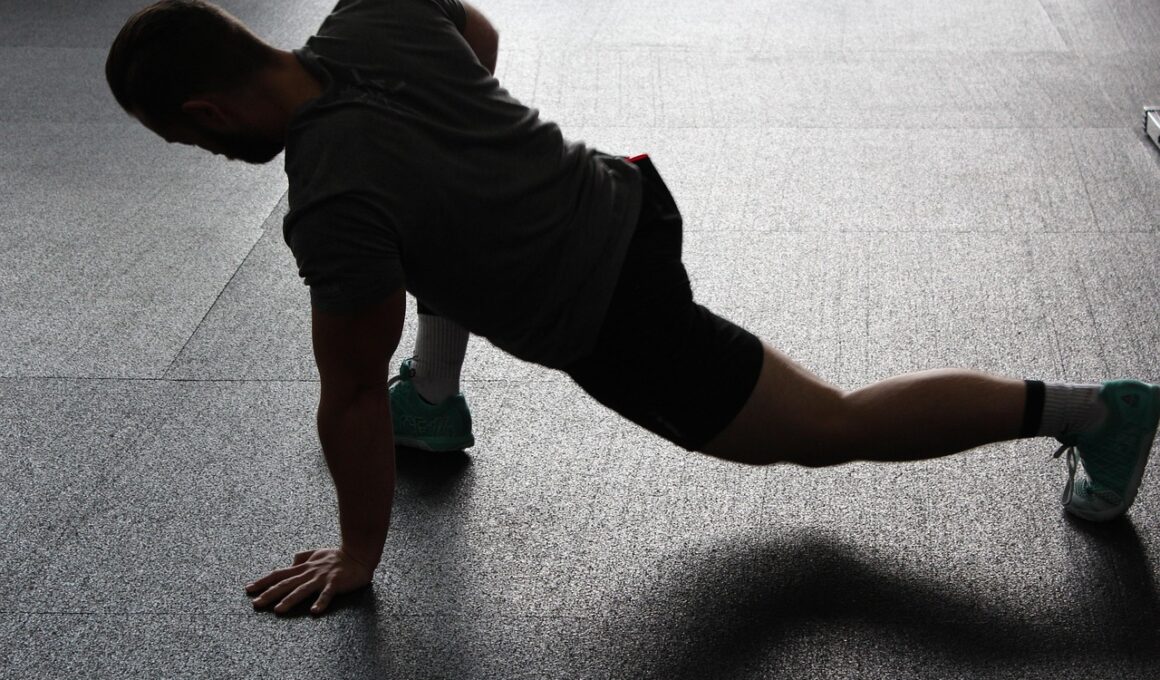Benefits of Group Warm-Up Sessions in Team Training
Group warm-up sessions play a pivotal role in sports performance, enhancing team cohesion and preparing athletes physically. These sessions not only increase blood flow to muscles but also improve flexibility and range of motion. Engaging in warm-ups as a team fosters a collective spirit, setting the stage for better communication and synergy. When team members warm up together, they establish a routine that can enhance performance during practices and games. Group dynamics naturally help in motivating individuals to push themselves further than they might alone. Additionally, these sessions allow coaches to observe the athletes collectively, detecting any physical issues that might require attention. One significant benefit of warm-ups is the reduction of injury risk, as muscles are gradually prepared for intensive activity. Incorporating dynamic stretches and sport-specific movements during these sessions can lead to improved performance metrics. Furthermore, the psychological benefits of group workouts, such as increased focus and morale, cannot be overlooked. Despite the physical nature, it’s essential to create a supportive environment where every team member feels valued and empowered. Overall, the advantages of group warm-up routines are numerous and immeasurable in enhancing athletic performance.
Another key advantage of group warm-ups is the opportunity for athletes to learn from each other. When individuals engage in warm-up activities together, they can observe proper techniques and movements that enhance their approach. Peer learning is tremendously beneficial in sports, as athletes often adopt behaviors from one another, leading to overall improvement. Moreover, practicing together allows the team to integrate specific strategies or game plans through warm-up routines, enhancing understanding and execution of these concepts later in competitive situations. Group warm-ups also provide an ideal time for athletes to acclimate to each other’s pace and intensity, refining their synchronization crucial for team sports. These initial physical interactions serve as a crucial step in promoting not only physical preparedness but also individual confidence. When athletes can see their peers executing drills successfully, it fosters a safe learning environment. Coaches often capitalize on these sessions to instill team morale and collective ambition, vital for achieving common goals. Therefore, group warm-ups can significantly contribute to skill development, both individually and collectively, ensuring that everyone gets the most out of the team’s training efforts. Enhanced teamwork starts with effective warm-up practices that elevate preparedness and cohesion.
Enhanced Team Dynamics and Communication
Efficient warm-up sessions serve as a catalyst for improved communication among team members. During warm-ups, athletes engage in conversation and connection, building rapport which translates to better collaboration during games. This aspect of team dynamics is critical in sports since successful performance highly depends on players’ understanding of each other’s movements and intentions. Initially, warming up together allows teammates to share insights on their preparedness levels, which can affect in-game decisions and strategies. As they navigate these shared physical activities, they develop a non-verbal understanding that can improve coordination under pressure. Furthermore, group warm-ups can create a sense of accountability, encouraging athletes to perform at their best. When individuals see their teammates working hard, it compels them to match that energy, fostering a culture of collective effort. Enhanced communication also tends to reduce misunderstandings that may occur during gameplay, minimizing errors and promoting on-field harmony. Regular warm-up sessions enhance interpersonal relationships, cultivating mutual respect and trust. In conclusion, the advantages of group warm-ups extend beyond just physical benefits; they enhance overall team chemistry and in-game performance leading to significant competitive edge.
One cannot underestimate the importance of a structured warm-up routine that is inclusive of all team members. Inclusivity during warm-ups ensures that every individual feels acknowledged and valued. By involving every athlete in a routine designed for all skill levels and physical abilities, teams foster an environment of belonging. This approach can significantly enhance the motivation of each athlete, knowing that their unique contributions are recognized. Additionally, encouraging participation from everyone can enhance self-confidence, leading to increased enthusiasm and commitment towards training sessions. Warm-ups should not just be seen as a prelude to training but as an integral part of athletes’ overall development. When members participate actively, they can provide feedback to one another, promoting a growth-minded culture. Moreover, the camaraderie developed during these warm-up sessions can strengthen team relationships, leading to improved performance in competitions. Teams that prioritize inclusive warm-up routines demonstrate resilience and adaptability, which are crucial in high-pressure situations. Furthermore, these operations lead to enhanced individual accountability, where each athlete understands their role within the team framework. Such dynamics cultivated in warm-ups often reflect in-game situations, making it vital for coaches to emphasize the importance of these preparatory sessions.
Increased Physical Preparedness and Performance
Group warm-up sessions are essential in increasing not only physical preparedness but also on-field performance. Engaging in warm-up activities together effectively activates muscle groups that will be used during the training or game, significantly reducing the likelihood of injuries. Optimizing mobility before engaging in intensive physical activity ensures that all team members can operate at their full capacity during sessions and competitions. A well-designed warm-up routine incorporates various dynamic stretches that promote muscle elasticity while improving range of motion. Effective warm-ups will also include sport-specific drills tailored to ensure athletes are mentally and physically prepared for the challenges they will face during gameplay. Studies show that group warm-ups contribute to improved anaerobic and aerobic performance measures, highlighting their effectiveness. Athletes participating in structured warm-ups tend to demonstrate enhanced coordination and reaction times, which are crucial in fast-paced sports. By enhancing physical condition, teams can experience long-term advantages, particularly during exhausting matches where maintaining peak performance can make a critical difference. In conclusion, prioritizing group warm-ups not only prepares athletes physically for the game but also cultivates an environment conducive to improved competitive output.
Group warm-up routines also foster competition in a healthy manner among team members. These sessions can include friendly challenges, creating a fun atmosphere that encourages athletes to push their limits. When teammates engage in high-energy activities mean to light-hearted competition, it can significantly elevate the overall performance during training and games. This competitive spirit is beneficial not only for bonding purposes but also for developing individual skills. The drive to outperform each other positively contributes to better skill acquisition and improvement. Additionally, these warm-up sessions can serve as benchmarks for tracking progress over time. By engaging in friendly competition, players can see how they measure against their peers and strive to enhance their capabilities continuously. Coaches may leverage this aspect of group warm-ups to instill essential life skills such as resilience and determination, further integrating it into the development process. Structuring warm-ups to challenge athletes while they collaborate and motivate one another can lead to a robust team culture ripe for achieving goals. Therefore, promoting healthy competition within group warm-ups is a strategic approach to improving overall performance while maintaining team synergy.
Promoting Mental Readiness and Focus
Along with physical advantages, group warm-up sessions contribute significantly to mental readiness among athletes. These moments establish a transitional space, allowing players to shift their mindset from ordinary activities to the intense focus required for performance. Engaging in cooperative activities during warm-ups can evoke feelings of excitement and anticipation, which are vital for optimal performance. The social interaction that occurs engages the athletes’ minds, encouraging a positive mental attitude that is essential for sporting success. A well-structured warm-up can integrate visualization techniques, allowing players to mentally rehearse their strategies and roles. This mental conditioning can help alleviate pre-game anxiety and fears, preparing athletes to face opponents with confidence. Additionally, warm-ups serve as an opportunity for athletes to connect emotionally, building relationships that can positively influence performance collectively. When players feel mentally and emotionally supported by their team members, it boosts their resilience and determination. As a result, fostering mental readiness through group warm-ups enhances overall team cohesiveness during gameplay. Such routine mental preparation can lead to improved decision-making under pressure, significantly enhancing team performance. In summary, group warm-ups not only physically prepare athletes but also set the tone for mental readiness.
In conclusion, the myriad benefits of group warm-up sessions in team training cannot be overstated. From improved physical readiness and enhanced team dynamics to mental preparation and healthy competition, these initial activities play a crucial role in overall sports performance. Coaches and athletes alike should prioritize incorporating structured warm-ups into their training routines, recognizing their vital importance. The cumulative effect of engaging in warm-ups together leads to improved relationships and understanding among team members, setting the foundation for successful collaborations on the field. Additionally, fostering an inclusive environment during warm-ups ensures that all athletes feel valued, enhancing their motivation and commitment. Overall, group warm-ups are an essential component of effective team training, not only enhancing performance but also promoting a positive team culture supportive of individual growth. As teams embrace these practices, they prepare themselves not just for victory but for building lasting relationships that contribute to a thriving sporting experience. Ultimately, prioritizing group warm-ups enables teams to maximize their potential, thereby enhancing their competitive edge throughout the sporting season.


